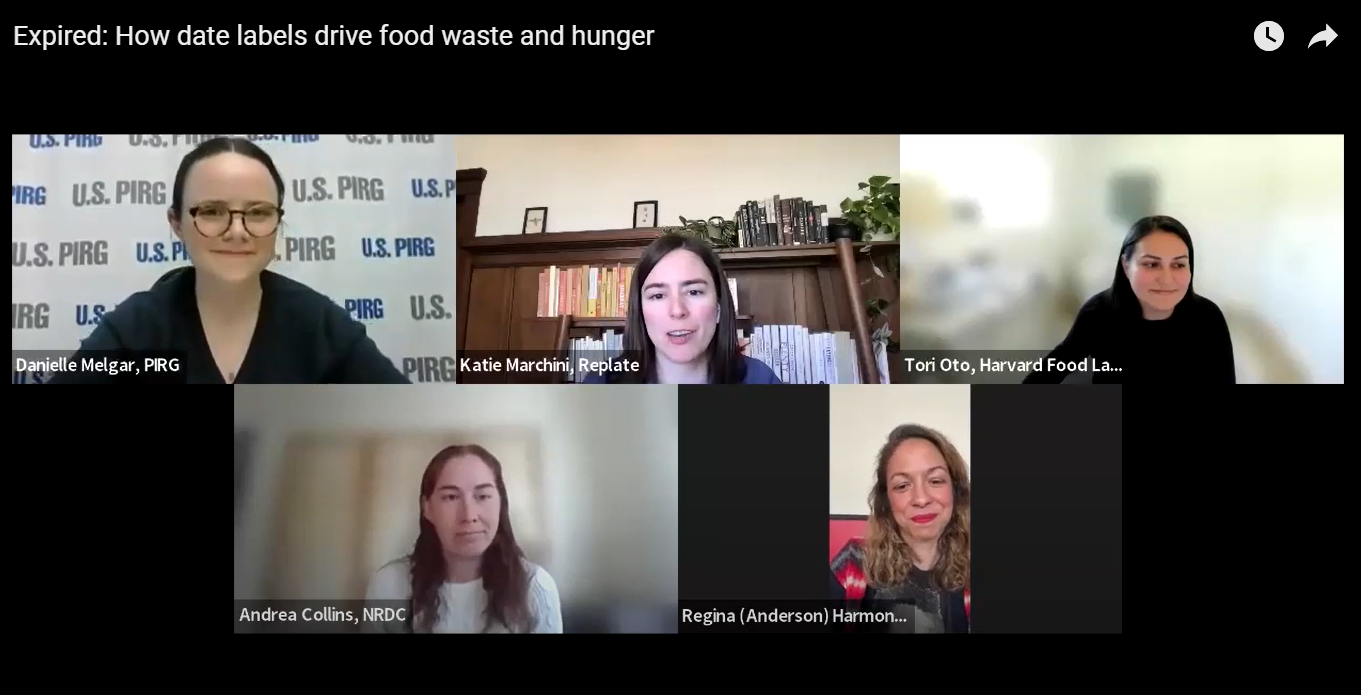
U.S. PIRG Zero Hunger Campaign: Fall Semester in Review
U.S.PIRG believes that no one should go hungry when we produce more than enough food already to feed everyone, and waste 40% of it. So, together with dozens of campuses with student PIRG chapters around the country we launched our Zero Hunger campaign last year to end hunger.
U.S. PIRG Zero Hunger Campaign:
Fall Semester in Review
Damiana Dendy, U.S.PIRG Zero Hunger Campaign Associate
U.S.PIRG believes that no one should go hungry when we produce more than enough food already to feed everyone, and waste 40% of it. So, together with dozens of campuses with student PIRG chapters around the country we launched our Zero Hunger campaign last year to end hunger.
On July 26th, we partnered with the Congressional Hunger Center (CHC) to host a workshop entitled “Tackling Hunger in Your Home Community & U.S. PIRG’s Zero Hunger Campaign.” We led a training on community organizing, building a campaign, and launching the Zero Hunger Campaign on a campus. This training was geared toward CHC summer interns, but was open to all Washington DC interns interested in tackling food insecurity in their home or campus communities. CHC had held various workshops over the summer to teach their student interns about the impact of hunger throughout the US. Our joint workshop was their final one of the summer and was intended to synthesize all that the students had learned and channel their ambition and skills into advocacy. With the help of our Zero Hunger intern hired for the summer, we discussed the elements of a campaign, how to launch a Zero Hunger Campaign in your own community, and led an op-ed writing exercise to work on effective campaign messaging. Our jointly run workshop brought us closer to the Congressional Hunger Center and their great work generating our nation’s next leaders in the food security world, and now our next Zero Hunger campaigners.
Training with Congressional Hunger Center
In August, we worked with another partner of ours, Campus Kitchens Project (CKP), to lead two more trainings on community organizing and campaign building. Campus Kitchens has student chapters on about sixty-five campuses across the US and brings those campuses together annually for a summer Boot Camp, a three-day intensive training for student leaders in CKP. During our two trainings, we met students from twelve different schools, as well as faculty members and community leaders, all of whom were excited to bring zero hunger home.
Training at Campus Kitchens Boot Camp
In October, we connected with Congresswoman Judy Chu’s office due to their work on H.R. 6112, or the Campus Hunger Reduction Act of 2018. This bill would permit institutions of higher education to be eligible for the USDA Community Food Projects USDA grant, making it much easier for colleges and universities to adopt programs for food recovery and distribution. Thus, this bill would be a great help for many campuses that have food resources for addressing student hunger, but have a lack of monetary resources. U.S. PIRG supports and endorsed this bill, and has a lasting relationship with Congresswoman Chu’s office. We are now in the process of writing a joint op-ed with their office which will highlight Miriam Nunez, a student leader of UCLA CalPIRG Students, who is from Representative Chu’s congressional district.
This November, we had a week-long campaign launch across eleven campuses. Campuses from Maryland, Massachusetts, Kentucky, New Jersey, California, Oregon, and Connecticut joined in this launch week which also coincided with national Hunger and Homelessness (H&H) Awareness Week. Through our partnership with CKP and the connections made with students during earlier trainings, we had the pleasure of involving CKP students in our launch week as well. We decided to hold our launch during H&H Awareness Week, which was set in motion by U.S. PIRG in 1982, because we knew that H&H Week always attracts hundreds of students to come together and discuss homelessness and hunger in their campus community and participate in service or educational events.
University of Oregon volunteer leader, Jill Cougle
This year, we took this effort to the next level by giving H&H participants a campaign to sign onto. We received over 1,900 petition signatures urging campus administrations to make public commitments to achieving zero hunger by cutting waste as a result. We also successfully published op-eds and press releases across the country and got several student organizations signed on to support our national campaign.
Hunger Banquet co-hosted by MASSPIRG students and Oxfam at UMass Dartmouth
At Oregon State University we published an op-ed about Zero Hunger which was co-written by OSU’s Assistant Director of the Human Services Resource Center who works to provide students with basic needs. The University of Kentucky Campus Kitchens Chapter also got an article published by the School of Human Environmental Services about CKP joining our campaign.
Volunteers at the University of Kentucky
With all that we have achieved this past semester, we are well prepared for achieving our goal of recruiting ten campuses to commit to zero hunger by cutting waste in 2019.
Topics
Find Out More


New report reveals widespread presence of plastic chemicals in our food

How much food waste does America create and what can we do about it?

